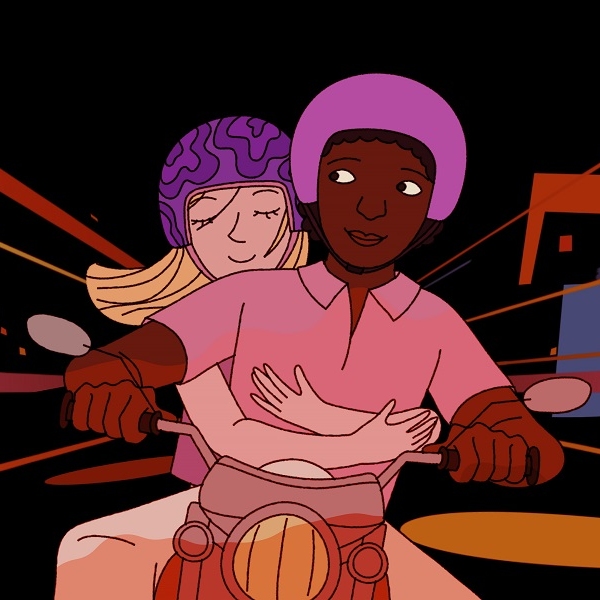About a week before The Queen’s Gambit made its debut on Netflix, Allan Scott, BA’61, was working with his collaborators on the final edits for the TV series that would soon become an international sensation.
“Editing a seven-part series is quite the undertaking – not that I was the editor, but I was supervising it,” says Scott, the show’s co-creator and executive producer.
Those final edits marked the end of a 30-year journey for Scott. He acquired the film rights to Walter Tevis’ 1983 novel about Beth Harmon, an extraordinarily gifted but troubled chess prodigy, in 1990, and had been trying to bring The Queen’s Gambit to screens ever since.
“From time to time, it looked like we were going to get it made and then, for one reason or another, we didn’t,” says Scott. “I worked on 11 drafts of a screenplay and I’ve worked with nine different directors on this over the years.”
Some of the directors that Scott had serious talks with included Michael Apted (Coal Miner’s Daughter) and Bernardo Bertolucci (The Last Emperor). At one point, Scott was working closely with Heath Ledger on an adaptation. Ledger himself was an accomplished chess player and The Dark Knight actor was planning to make his directorial debut with The Queen’s Gambit.
Those plans were shattered when Ledger died of an accidental prescription drug overdose in 2008.
“We were talking on the phone literally the day before he died,” says Scott. “We were talking about the music we might use [in the film]. He knew nothing about the music of the fifties and sixties [the period during which the story takes place] and I knew everything. We had a lovely chat about that. After Heath died, I just didn’t want anything to do with it, so I left it alone for about three years.”
Netflix, for one, must be grateful that Scott ultimately returned to the project and brought it to the finish line. The streaming colossus recently announced that The Queen’s Gambit, which premiered in late October, has already become the most popular scripted mini-series in Netflix history. It’s a hit in North America, in the United Kingdom, in Israel, in Argentina, in South Africa, in Russia – pretty much everywhere.
Why did Scott persevere?
“I just liked it,” he laughs. “If you like something and you want to do it, you hold on to it. Nobody ever came along and offered me a huge amount of money to let go of it.”
And it’s not like Scott didn’t have other things to occupy his time over the past three decades. As a screenwriter and producer, he has been involved with almost two dozen films, scripting lines for the likes of Donald Sutherland, Julie Christie, Goldie Hawn, Richard Harris, Whitney Houston and Denzel Washington.
He has made five films with British director Nicolas Roeg, including the cult classic Don’t Look Now. Roger Ebert described that movie as “one of the great horror masterpieces,” while David Cronenberg, who knows a thing or two about scaring people, cites it as one of the most frightening films he has ever seen.
Scott also adapted the film The Adventures of Priscilla, Queen of the Desert into a smash-hit theatrical musical that toured the world and earned a Tony among other prizes.
In the end, Scott partnered with writer and director Scott Frank (Logan) on The Queen’s Gambit – the two met because of their mutual interest in doing a remake of a Roeg movie based on another Tevis book, The Man Who Fell to Earth.
“Scott and I had a very happy collaboration. He is the hardest working director I have come across and the shoot – mostly in Berlin – was one of the happiest and smoothest I have experienced.”
He also has praise for actress Anya Taylor-Joy and her performance as Beth. “I think Anya brought an interesting complexity to the role by the faintly mysterious stillness she gave the character.”
Scott says he knows why The Queen’s Gambit has done so well.
“It’s the same reason I held on to it for all those years – it’s a terrific story. It’s almost like a Victorian melodrama – it’s really well-structured. How can your heart not go out to a child who loses her mother in a car crash, is shipped off to an orphanage, and somebody there spots her unique talents – all those things are what a good drama is made of. I think people recognized that they were going to be moved by [the show] and they have been.”
TV critics seem to agree. The show is turning up on the best-of-the-year lists of several publications, including Time, The Atlantic, The Economist, The Los Angeles Times, The Globe and Mail, Slate and The Boston Globe.
Scott is particularly pleased by the fact that the show has been embraced by the chess community. Jennifer Shahade, a two-time U.S. women’s chess champion, told Vanity Fair, “They completely nailed the chess accuracy.” Sales of chess sets are soaring thanks, in large part, to the show’s popularity.
“All the chess positions you see in the show were carefully worked out,” says Scott. “We always took [our portrayal of the chess world] very seriously, first of all, because Walter Tevis took it very seriously. By good fortune, we ended up working with the man [celebrated chess coach Bruce Pandolfini] who guided Tevis through all the chess intricacies when he was writing the book.
“We also had [former world chess champion] Garry Kasparov. Garry was wonderful. He read all seven scripts in one night and we met him for lunch the next day, Scott and I, and the first thing he said was, ‘It’s fine, it’s fine, the only thing is, at this level of chess, nobody ever says check or checkmate – and your script is littered with people saying check and checkmate. It just doesn’t happen.’
“And the moment he said that, you think, of course they don’t, what were we thinking, but then we had a new problem because we had to find other ways to [show] the audience if Beth is in trouble in a match.”
Scott first broke into show business while he was studying at McGill. He had a powerful motivator.
“I had a hard time at McGill [financially],” recalls Scott, who arrived as an international student from Scotland. “I had a tiny budget. I remember having about 10 dollars a week to spend. It wasn’t a lot. I started doing stand-up comedy with this guy from the Faculty of Law [Chris Dobson, MCL’59, who would become Scott’s longtime writing partner] and we ended up getting paid $20 a gig.
“And then, when we were offered a professional job at the glamourous nightclub El Morocco, it was real money and that’s when I decided I had to change my name and hide my extracurricular activities from the University. It was frowned upon to be doing that sort of thing back then. One should be focusing on the subject matter [of their courses]. I had to change my name in a hurry and the only patriotic name I could think of was Scott.” (His real name is Allan Shiach.)
Looking back, Scott says the subterfuge and the sneaking around was worth it. “I earned $400 a week [at the El Morocco] and that changed my life.”
Scott honed some of his writing and acting skills as a member of McGill’s Red & White Revue. He also got involved in student journalism at the University.
“I was the features editor for the McGill Daily and one of my tasks was to [publish] a poem once a week. I had this guy who kept sending in these wonderful poems that I happily published. I got into a bit of trouble, because it turned out that he was no longer a student at McGill, but he just liked to see his work published. So that’s how I ended up publishing Leonard Cohen’s poems about 10 years before he became a superstar.”
Scott has had the opportunity to work with some of the biggest names in the film business. Did any of those actors stand out for him?
“Most of these people are absolutely delightful, charming, stimulating – and that’s how they got to be where they are. I had a lovely time working with all of them. I can think of only one exception – and I will keep that name to myself.”
While the projects he has worked on have varied considerably over the years, Scott says his fundamental goal as a writer and producer remains consistent.
“The constant challenge on [any project] is to make sure the audience is paying attention all the way through. It’s very easy to lose their attention. So, what is your main task [as a creator]? Your main task is to make it interesting, to make it not boring.”


